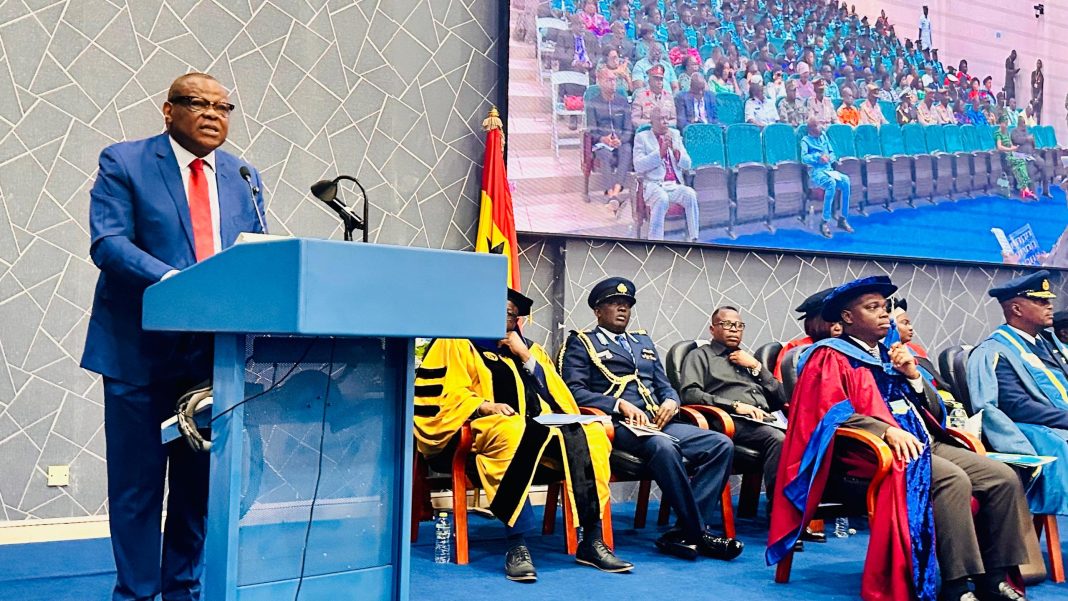By James Amoh Junior, GNA
Accra, Nov. 1, GNA – Mr Emmanuel Habuka Bombande, a renowned peacebuilding expert and diplomat, has called on Africans, particularly emerging leaders in peace and security, to uphold ethical leadership, fairness, and justice as the foundation for sustainable peace across the continent.
Mr Bombande, delivering the keynote address at the 14th Graduation Ceremony of the Kofi Annan International Peacekeeping Training Centre (KAIPTC) in Accra, cautioned that Africa’s peace and development could not thrive in an environment where political interference, inequality, and corruption persisted.
The ceremony, which brought together diplomats, senior military officers, traditional leaders, academics, and peace practitioners, was on the theme: “Building African Agency for Peace and Security in a Changing World.”
It marked the graduation of 101 students from Ghana, Nigeria, and Zambia, who successfully completed postgraduate studies in Conflict, Peace and Security; Gender, Peace and Security; and Doctor of Philosophy in Conflict, Peace and Security.
Mr Bombande said the theme was timely, reflecting the urgent need for Africans to take ownership of their peace and security agenda amid global power shifts and rising instability.
He noted that the world had transitioned into a multipolar system where political and economic power was increasingly dispersed, yet global cooperation on peace and security continued to decline.
“Our continent is experiencing an unparalleled degree of proxy warfare, making crises such as those in Sudan nearly impossible to resolve,” he said.
He added that, “This trend undermines the core principles of multilateralism and global cooperation, threatening the very foundations of the United Nations system.”


Mr Bombande lamented that, despite West Africa’s long history with conflict, institutions such as ECOWAS had not yet been reformed to effectively anticipate and prevent regional crises.
He urged African states to strengthen regional cooperation and invest in proactive conflict prevention mechanisms rather than reactive interventions.
Drawing on historical examples, he cited how the Liberian civil war of the late 1980s and 1990s spilled over into Sierra Leone and later into Côte d’Ivoire, destabilising the sub-region for years.
“Internal conflicts can easily become regional crises if we fail to address their root causes, issues of injustice, exclusion, and governance failure,” he cautioned.
He observed that the majority of current conflicts in Africa were internal, often rooted in chieftaincy disputes, land conflicts, and political manipulation.
Mr Bombande warned against the increasing tendency of political actors to interfere in traditional and chieftaincy matters for political gain, describing it as a threat to Ghana’s peace and social cohesion.
“Peace is not the absence of war; it is rooted in justice, what we call justpeace, anchored in fairness, equity, and inclusion,” he said.


He noted that, “Whenever we see political meddling in chieftaincy affairs, we must collectively express our disapproval, because such interference deepens divisions and prolongs disputes.”
Mr Bombande, also the co-founder of the West Africa Network for Peacebuilding (WANEP), urged the graduates to translate their academic training at KAIPTC into practical, ethical, and empathetic
engagement in their professional fields, reminding them that peacebuilding required both intellectual discipline and moral courage.
“It is not enough to speak about justice and corruption; what is essential is ethical decision-making,” he noted, and that, “As peacebuilders, you must lead with integrity, transparency, and accountability, ensuring that your actions reflect the values you profess.”
Mr Bombande, who has served in senior roles in peacebuilding across Africa, also highlighted the critical role of gender inclusion in promoting sustainable peace.
He said the growing number of professionals trained in Gender, Peace and Security at the KAIPTC was an encouraging sign that Africa was gradually embracing the principle that “no one should be left behind” in efforts to build peace.”


Vice President, Professor Naana Jane Opoku-Agyemang, in a speech delivered on her behalf by Mr Alex Segbefia, Chief of Staff at the Office of the Vice President, commended the Centre for its leadership in shaping Africa’s peace and security agenda.
She announced government’s approval for the completion of KAIPTC’s long-abandoned building complex through a public-private partnership.
The facility, when completed, will expand training and research capacity and further strengthen Ghana’s position as a hub for peacekeeping excellence in Africa.
The Commandant of the Centre, Air Commodore David Anetey Akrong, congratulated the graduates for their resilience and perseverance and encouraged them to use their knowledge to contribute meaningfully to peacebuilding across the continent.
Established in 1998 and named after the late former United Nations Secretary-General Kofi Annan, the KAIPTC has become a continental leader in peacekeeping and conflict management education.
It provides academic and professional training for security officers, diplomats, and civilian practitioners across Africa, working closely with the African Union, ECOWAS, and the United Nations.
GNA
Edited by Christian Akorlie
